The Curing Retinal Blindness Foundation is extremely grateful to the below talented individuals for donating their time, wisdom, and knowledge to help guide our board in the funding of research for degenerative retinal diseases.
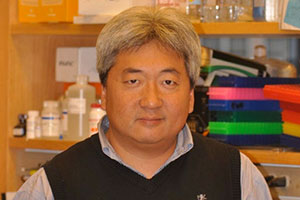
Dan Chung, DO, MA
Concurrently, he served as the scientific advisor on the RPE65 gene therapy study team at the Children’s Hospital of Philadelphia (CHOP). He was the PI and first author for the RPE65 natural history study and the Multi-luminance Mobility Test (MLMT) validation study. Dr. Chung earned his medical degree from the New York Institute of Technology College of Osteopathic Medicine and completed his residency in Akron, Ohio. He then completed fellowships in pediatric ophthalmology and ocular genetics research at the Cole Eye Institute at the Cleveland Clinic, with additional training in retinal gene therapy at the National Eye Institute/NIH in Bethesda, MD. As the medical strategy lead for ophthalmology, he works in the areas of medical affairs, clinical development and operations, pre-clinical studies, patient advocacy, commercial and marketing and business development.
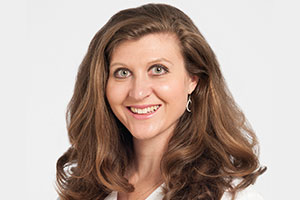
Meghan DeBenedictis, MS, CGC, MEd
She then began offering clinical genetic counseling services in a retinal dystrophy clinic at the Cole Eye Institute and over the years, she has grown her clinical practice providing clinical ophthalmic genetic counseling and testing for patients with any form of inherited eye disease. She is also an integral team member of the Cleveland Clinic Center for Personalized Genomics Healthcare and is on the program advisory board for the Case Western Reserve University Genetic Counseling Training Program. In 2017, she received her second Master's Degree in Health Professionals Education. Ms. DeBenedictis has served as study coordinator and/or co-Investigator on numerous clinical trials, including the ProgStar studies, Spark Therapeutics' Natural History Study for Choroideremia, and Acucela Inc.'s Phase 2 study for Emixustat in Stargardt disease. Additionally, she was the Argus II Retinal Prosthesis program manager for the Cole Eye Institute, which became the leading Argus implantation center in North America. Ms. DeBenedictis was recently nominated as President-Elect of the Ohio Association of Genetic Counselors, is a member of the National Society of Genetic Counselors (NSGC), and serves as the Education Coordinator for the Ophthalmology and Hearing Loss Special Interest Group through NSGC. She also serves on the Executive Board for the International Society of Genetic Eye Diseases & Retinoblastoma and is on the Editorial Board for the journal, Ophthalmic Genetics. As a genetic counselor, she has been able to provide a unique perspective into the diagnosis and treatment for patients with inherited eye diseases.
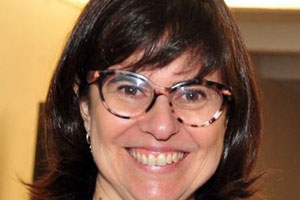
Profa Dra Juliana M Ferraz Sallum
Fellowship with Prof Irene Maumenee at Johns Hopkins University, Master and Doctoral Degree Instituto de Genética Ocular in São Paulo, Brazil.

Marius Ueffing, PhD (Dr. rer. nat.)
Marius has a background in protein science and molecular and medical genetics and has a long-standing history of contributions to medical research. His previous positions included a Research Associate position at Columbia University, College of Physicians and Surgeons, New York, followed by group leader positions in pharmaceutical industry at Goedecke-Parke-Davis and in the Division of Medical Genetics at the University Medical Centre Munich. Before and jointly with his appointment to Tübingen, he was Director of the Independent Research Unit of Protein Science at the National Research Centre for Environment and Health in Munich.
He and his group are focused on uncovering molecular mechanisms of retinal disease identifying disease drivers and biomarkers towards development of new precision medicine diagnostics and therapy based on the mechanistic and holistic understanding of pathomechanisms on a systems level. Between 2015 and 2020 Marius coordinated the EU Horizon2020 Systems Medicine Project EYE-RISK (www.eyerisk.eu) that focuses on AMD.
Marius has a background in protein science and molecular and medical genetics and has a long-standing history of contributions to medical research. His previous positions included a Research Associate position at Columbia University, College of Physicians and Surgeons, New York, followed by group leader positions in pharmaceutical industry at Goedecke-Parke-Davis and in the Division of Medical Genetics at the University Medical Centre Munich. Before and jointly with his appointment to Tübingen, he was Director of the Independent Research Unit of Protein Science at the National Research Centre for Environment and Health in Munich.
He and his group are focused on uncovering molecular mechanisms of retinal disease identifying disease drivers and biomarkers towards development of new precision medicine diagnostics and therapy based on the mechanistic and holistic understanding of pathomechanisms on a systems level. Between 2015 and 2020 Marius coordinated the EU Horizon2020 Systems Medicine Project EYE-RISK (www.eyerisk.eu) that focuses on AMD.
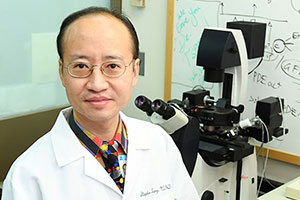
Stephen Tsang, MD, PhD
He received his M.D.- Ph. D. degrees from the NIH-National Institute of General Medical Sciences Medical Scientist Training Program (MSTP) at Columbia University. Dr. Tsang then completed his postdoctoral fellowship at Jules Stein Eye Institute/UCLA under the guidance of Professors Debora Farber, and Bartly Mondino.
He has produced an impressive body of work that spans fundamental basic science and to the biochemical and genetic basis of retinitis pigmentosa (RP) to preclinical trials for gene therapy to treat the disease. A true pioneer in many clinical-physiological dimensions, he made the first gene-targeted model for a recessive form of retinitis pigmentosa (RP) with gene-targeting in embryonic stem cell technology; this model is used in current research by numerous laboratories. The results from his PDE6 projects provided the solid foundation to start a gene therapy trial titled, “Bringing Gene Supplementation Therapy for PDE6-associated Retinopathies into Clinical Practice” to be supported by Tistou and Charlotte Kerstan Foundation. His contributions to RP were recognized by the 2003 Burroughs Wellcome Career Award in Biomedical Science, 2005 Bernard Becker Association of University Professors in Ophthalmology's Research to Prevent Blindness Award; 2013 Dr. Bradley Straatsma lectureship, ARVO Foundation 2006 Alcon, 2011 Genentech and 2013 Pfizer- Carl Camras awards.
In addition to bench research, Dr. Tsang is also a well respected educator and clinician. As a Director of an Ophthalmology-Basic-Science Course, he received rave reviews, and the enrollment doubled since he took over the responsibility of the course director. Among his trainees are Nan-Kai Wang, MD at Chang Gung Memorial Hospital and Werner Cella, MD at Brasília who now run referral centers for retinal degenerations in Taiwan and Brazil, respectively. Dr. Wang has just elected to the Macular Society, an honor society of the world’s top 430 retinal physicians. A highly sought after physician, Dr. Tsang receives numerous referrals, both domestic and international.
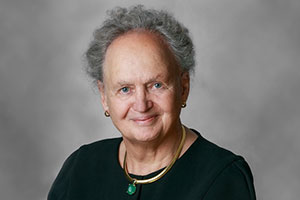
Irene Maumenee, MD
She is a medical school graduate of the University of Goettingen, Germany. She joined the Department of Ophthalmology at the University of Geneva, Switzerland, where she wrote a thesis on X-linked retinitis pigmentosa. From there she moved to the University of Honolulu, Hawaii, where she studied population genetics. As part of her studies, she initiated the long term analysis of achromatopsia on Pingelap, a small island in the Federated States of Micronesia. The studies resulted in identification of the first gene for colorblindness, CNGB3.
She moved to the Department of Medical Genetics at Johns Hopkins University in 1969. The Department had been founded by Dr Victor A McKusick, who had a strong interest in disorders of connective tissue, including the Marfan Syndrome. Her interest in genetic eye diseases made her welcome at the Institution and she stayed the next 40 years. She wrote her AOS thesis on the Marfan Syndrome and continues to work on the group of diseases, which entail dissections of the aorta.
She recently joined the Faculty of the Department of Ophthalmology at Columbia University Medical Center. She will continue her studies in genetic projects at this institution.

Michael E Selzer, MD, PhD, FRCP Director
Those that are bad regenerators downregulate neurofilament (NF) mRNA expression permanently after axon section, whereas good regenerators show recovery of NF expression. Since the regenerating axon tips lack filopodia, have sparse F-actin and are densely packed with NFs, the Selzer lab is testing whether NFs are involved in the mechanism of regeneration. They are now using in vivo micro-imaging and two-photon microscopy to distinguish axons that are actively regenerating from those that are static or retracting and observe their responses to pharmacological and molecular manipulations. Using these microimaging techniques, they have found that axon regeneration is intermittent and that increasing cAMP activity increases the velocity of axon regeneration but not the time spent in forward movement, as opposed to stasis or retraction. Another characteristic of bad regenerating neurons is their upregulation of receptors for certain guidance molecules after axotomy. In other systems, these receptors act as “dependence receptors,” activating an apoptosis cascade when they are not bound by their ligand. With Dr. Michael Shifman, Dr. Selzer has found that the ligands for these receptors are down-regulated transiently near the site of spinal cord transection, and that the bad-regenerating neurons undergo delayed apoptotic cell death, i.e., they are TUNEL and caspase 3 positive and eventually disappear. Thus, the lab is now testing whether certain neurons are bad regenerators because at the time of assessment, they are already undergoing very slow dependence receptor-mediated apoptosis.
Dr. Selzer is the recipient of numerous grants and awards from the NIH and other government and voluntary organizations and has served on peer review panels for the NIH, the Department of Veterans Affairs and the National Multiple Sclerosis Society.
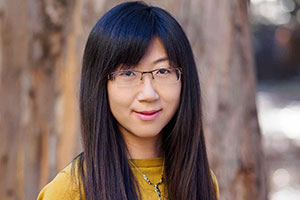
Mina Sun, PhD
She holds a PhD from Biophysics at Northwestern University. Besides being a valued member of our Scientific Advisory Board, Mina is also the parent of a child diagnosed with CRB1.

